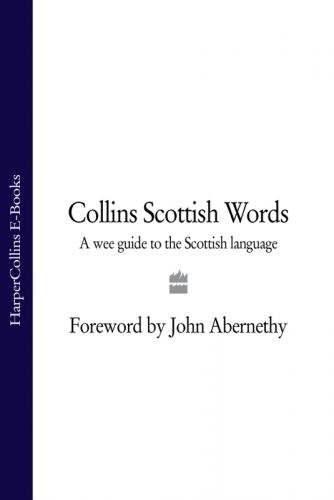boorach or bourach (pronounced boo-raCH) noun 1 spoken in Northeast a group of assorted people or things: a boorach o’ fowk 2 spoken in Highlands a mess or a disorderly state or heap: I’ve only been away a week and the house is a boorach. [Gaelic]
bosie (pronounced boe-zi) noun spoken in Northeast 1 an embrace or cuddle: Gie’s a bosie. 2 the bosom: Stick that flooer in yer bosie.
bowff or bouff (pronounced bowf) verb 1 to smell strongly and unpleasantly, like something rotten: Eeugh! This beer’s bowffin! 2 to bark, or to speak or cough in a way that sounds like a dog barking: Who’s dug is yon that’s aye bowffin? | noun a strong unpleasant smell: The bowff in that bedroom would sicken ye.
brae (pronounced bray) noun a hill or hillside: Set a stout hert tae a stey brae.
braw adjective fine or excellent: It’s a braw day. [a Scots form of brave]
breeks plural noun trousers or, occasionally, underpants: Ma breeks’re fallin doon! [a Scots form of breeches]
breenge verb to go somewhere or do something in a hasty and forceful, usually clumsy, way: He breenged his way through the crowd. | noun a forceful but clumsy rush: There’ll be quite a breenge when these doors open.
bubbly jock noun a male turkey [probably because of the noise it makes]
bumbaleerie (pronounced bum-buh-lee-ree) noun the backside: Ach, sit on yer bumbaleerie!
Who knew that was Scots?
Sometimes people come to Scotland expecting everyone to speak exclusively in broad Scots, rolling their r’s as if their lives depended on it and havering on about ‘a braw bricht moonlicht nicht’. Many Scots do have distinctive accents, and there are many local variations in both pronunciation and vocabulary. However, there are plenty of Scottish natives who don’t speak broad Scots – indeed it used to be said that well-educated citizens of Inverness spoke the clearest form of English in Britain! – but many of them might be surprised to learn that when they think they are speaking standard English their vocabulary may be peppered with Scotticisms that would puzzle an English speaker from elsewhere. Take, for example, the following sentence, which might conceivably be spoken by a Scot: If we can’t uplift the brambles outwith office hours, I doubt they’ll spoil.
This doesn’t fit in with the general idea of broad Scots, and yet there are several words here that could confuse an English person, who, attempting to convey the same meaning, would be more likely to say: If we can’t pick up the blackberries outside office hours, I believe they’ll spoil.
Similarly, a Scot being inoculated will have a jag, not a jab; go for the messages, not do the shopping; eat jeely pieces, not jam sandwiches; and wait for a bus or taxi at a stance, not a stand.
bumfle noun a wrinkle, crease, or fold in something: Wait till I press the bumfles oot that shirt. | verb to put wrinkles or creases in something: My skirt had got all bumfled up at the back. [from earlier Scots bumph meaning a lump or bump]
burn noun a stream or brook: Is there fish in that burn?
burny adjective extremely hot: Use a cloth tae hold that dish; it’s burny.
buroo (pronounced buh-roo or broo) or broo noun the dole, or the office where people sign on for their dole money: Has your buroo money come through yet?; He’s been on the broo for years. [from Employment Bureau, a former name for a Jobcentre]
but-and-ben (pronounced but-and-ben) noun an old-fashioned rural cottage consisting of two rooms, usually a kitchen and living room: They’re renting out the but-and-ben as a holiday cottage.
buttery or buttery rowie noun spoken in Aberdeen a type of crumbly, butter-rich, bread roll: Two cups of coffee and a couple of butteries, please.
byke or bike (pronounced bike) noun a wasps’ nest: We had a wasps’ byke in the attic last autumn.
byordinar (pronounced bie-or-dinar) adjective, adverb unusual or exceptionally: a maist byordinar day; It’s byordinar cauld for May. [from by in the sense beyond, plus ordinar ordinary]
byre (pronounced bire) noun a shed or stable where cows are kept: The kye are in the byre.
cailleach (pronounced kayl-yaCH or kal-yaCH) noun spoken in North & West an old woman: My memory of her is of a vague chain-smoking cailleach in eccentric garb and heavy henna. [Gaelic]
caller (pronounced kal-er) adjective fresh, especially referring to fish, fruit, or vegetables: caller herring
camstairy (pronounced kam-stair-ee) or camsteerie (pronounced kam-stee-ree) adjective quarrelsome, stubborn, or unruly: Let the camstairy auld deil dae whit he likes.
cantrip noun 1 a spell or magic charm: By some devilish cantrip slight, each in its cold hand held a light. (BURNS) 2 a playful trick: The bairns wouldnae be playin such cantrips if their faither was in the hoose.
carnaptious (pronounced kar-nap-shuss) adjective grumpy, bad-tempered, or irritable: She’s a carnaptious auld biddy! [from knap bite]
caul (pronounced kawl) noun spoken in South a weir or a dam: A broken branch was stuck at the caul.
causey (pronounced kaw-zi) noun 1 a cobbled street, road, or way: That causey’s awful slippy when it’s rainin. 2 a cobble or paving stone: She’s a lump on her heid the size o’ a causey.
ceud míle fáilte (pronounced kee-ut mee-luh fah-il-tya) interjection a hundred thousand welcomes: He couldnae spell ‘ceud míle fáilte’ so he just wrote ‘Hiya!’ [Gaelic]
This greeting is often seen on place-name signs for towns, as if one, genuinely warm, welcome were not enough for anybody.
champit tatties plural noun mashed potatoes, one of the traditional accompaniments to haggis, along with bashit neeps, in a Burns Supper
chauve or tyauve (pronounced chawv) spoken in Northeast verb to struggle, strive, or work hard, often with little to show for one’s exertions: Still chauvin awa? | noun a struggle: It’s a sair chauve for a half loaf.
chookie or chookie birdie noun a bird: Hear that wee chookie singin? That’s a blackbird.
